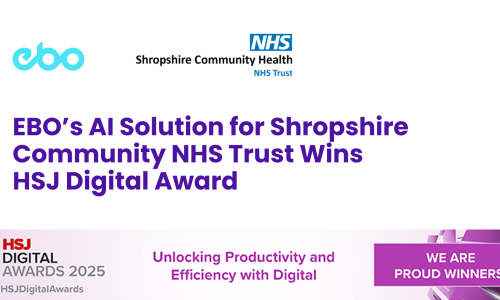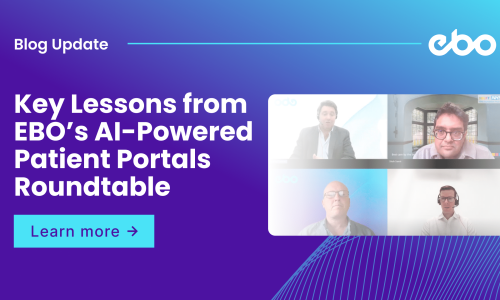
EBO’s CRO, James Neal, shares insights on how transforming patient engagement starts by replacing one-sided communication with a more dynamic, interactive approach.Here are his key points, as featured in World Health Tech News and Building Better Health.
How AI-powered solutions are transforming patient care by driving efficiency and accessibility
Artificial intelligence (AI) and machine learning have long been transforming industries across the board, streamlining operations and enhancing innovation. Now, it’s healthcare’s turn to harness the power of AI to bring about a shift in how we engage with patients – improving experiences, efficiency, and access to care.
In many sectors, AI has redefined user experience by automating tasks and creating seamless interactions. For healthcare, embracing these innovations is about meeting rising expectations from patients who are used to flawless digital experiences within other industries and demand accessibility in every area of their lives.The days of bureaucratic hurdles and inefficiencies are over.
IBM’s Senior Vice President, Paul Papas, aptly noted that “the last best experience that anyone has anywhere becomes the minimum expectation for experiences everywhere.” This insight is especially relevant to healthcare, where outdated systems fall short of meeting modern expectations. As Lord Darzi’s review highlights, many NHS processes remain cumbersome and inefficient, leaving both patients and staff frustrated with the lack of streamlined, user-friendly solutions.
The introduction of AI automation is not just a way to modernise—it’s an essential step to ensure the NHS can manage increasing demands and deliver sustainable care.
"Adopting AI automation isn’t just about appealing to the ‘modern’ patient and being there 24/7, on any device and available in any language."
Learning from Other Industries: The Financial Services Example
AI’s potential in healthcare can be seen in other sectors like financial services, which have embraced automation and interactive communication to meet high demand and deliver a more personalised experience. By implementing AI-powered systems, financial institutions provide customer service 24/7, across multiple languages and platforms, ensuring quick access to information at any time. The same capabilities can transform healthcare by reducing repetitive administrative tasks, freeing up resources for more complex care.
For instance, Exinity, a fintech company, has seen success in automating a significant portion of its customer interactions, improving efficiency and customer satisfaction while reducing operational costs. Applying this same technology to healthcare could empower patients, giving them more control over their healthcare journey while lightening the administrative load for providers.
How One Private Hospital is Leading the Way
Saint James Hospital is a prime example of AI’s potential in private healthcare. With a massive patient base and high appointment volume, the hospital was facing major communication bottlenecks, leading to inefficiencies.
Enter EBO’s AI-powered Virtual Assistant (VA). Today the VA autonimously handles over 12,000 bookings each month. With 93% of interactions completed by the AI, the hospital has significantly improved its operational efficiency, reduced staff workload, and enhanced patient satisfaction, boasting a 96% approval rating.
- Redefine Patient Engagement
- Build Meaningful Relationships
- Enhance Patient Access
From Analogue to Digital
Virtual Assistants powered by AI offer the ability to understand patient emotions, respond appropriately, and guide individuals through their healthcare journeys. These tools simplify complex systems and make healthcare more accessible by providing 24/7, two-way communication that’s adaptable to each patient’s needs.
"Moving from analogue to digital is not just about replacing old systems; it’s about creating a more personalised, engaging experience for patients. AI can automate routine tasks, improve communication, and streamline the healthcare process, giving patients more choices and better access to the care they need."
The Future of NHS Efficiency and Care
The potential for EBO’s AI solutions in healthcare is already being realised by nearly 20 NHS trusts and health boards across the UK, yielding impressive results. By implementing AI-driven automation, these organisations are reducing workloads, improving operational efficiency, and enhancing patient satisfaction.
The message is clear: to reform the NHS and improve patient care, it’s time to work smarter, not harder. AI can be the productivity tool that transforms the way healthcare operates—streamlining processes, reducing strain on resources, and ensuring better outcomes for patients. The tools are available, and it’s time to put them into practice.



